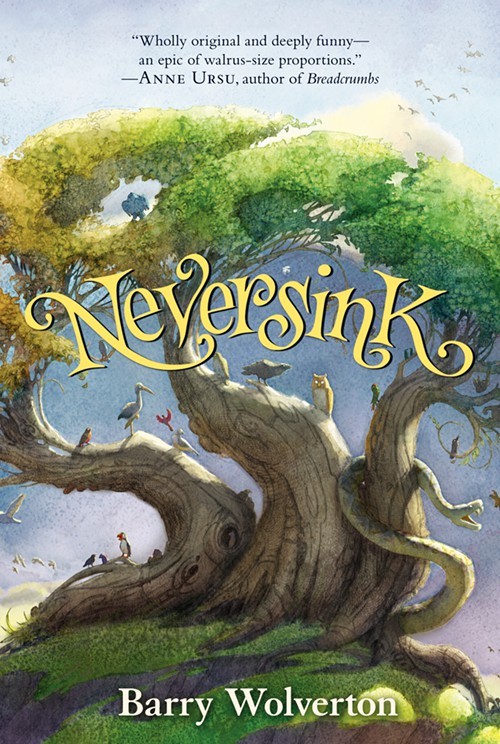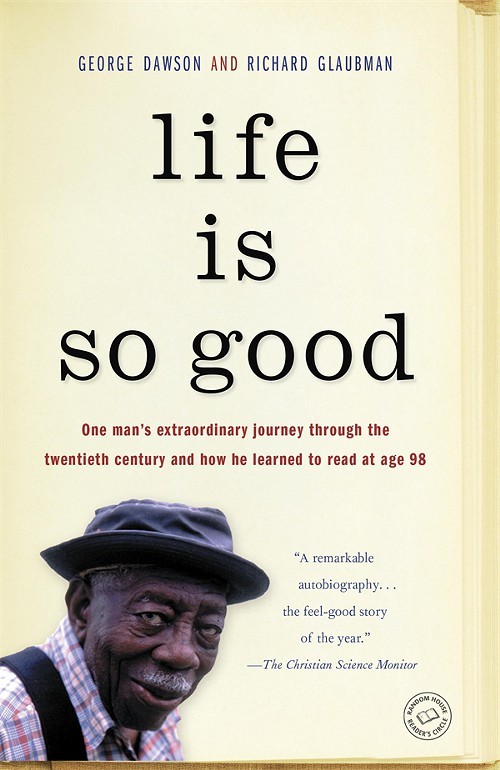Think of it as the Aukward Age, sometime after dinosaurs died out, before man appeared on the scene. And here we are: up at the Arctic Circle. There’s an island known as Neversink. Due north is a land known as Ocean’s End, and due east is another island known as Tytonia.
According to The Walrus Guide to Lesser Creatures (16th edition), you can divide the plump, duck-like seafarers known as auks, who live on Neversink, into puffins (“smallish, squidgy, improbable looking”), razorbills (“only auk sensibly named because of its wedge-shaped bill”), murres (who nest on cliffs, “presumably out of snootiness”), and guillemots (name “unnecessarily florid”; “noisy, disagreeable”; “grating”).
[jump]

Auks, you should also know, are not penguins. Neither is Egbert. He’s a scholarly walrus dead set on introducing reading and writing and something known as books to the wider, northern world. Egbert’s sidekick, Ruby? She’s a darting but level-headed hummingbird. They too live on Neversink.
Owls don’t. But like the auks, owls come in shapes, sizes, temperaments. There’s the snowy owl (“cool disposition”), the pygmy owl (“delusions of grandeur”), the scops owl (“resembles an overgrown moth”), and the great gray owl (“often overly self-satisfied”).
One thing, though, you can say about the owls of Tytonia: They rule! And a certain pygmy named Rozbell wants Neversink under his dominion — and Lucy Puffin’s scrumptious fish croquettes (known as smidgens) on his plate. But can a reluctant hero named Lockley Puffin, Lucy’s husband, keep his island colony free? After a grueling spirit journey to appease Sedna, goddess of the sea, Luckley can and he indeed does in Memphian Barry Wolverton’s very clever Neversink (Walden Pond Press/HarperCollins; drawings by Sam Nielson).
That book for middle-school readers has been named the 2014 Book of Choice for kids by Literacy Mid-South, and it’s featured in the organization’s “Read Across America” campaign for March. Copies of the book will be handed out to schools, Title 1 schools especially, to spur reading programs.
The March campaign isn’t only aimed at children, however. For adult Memphians, consider the life of George Dawson. His dream had always been to learn to read, and that dream began to become a reality on Dawson’s first day of reading class: January 4, 1996. He was 98 years old.
Richard Glaubman wasn’t there at the time, but he was in class, teaching fourth-graders in the Pacific Northwest. But he read of Dawson, then traveled to Dawson’s home in Dallas to record the man’s life and times.

Dawson, who grew up the grandson of a slave, witnessed the lynching of a friend in east Texas when Dawson was 10 years old. He went on to work on farms and in sawmills. He also “broke” horses, drove railroad spikes, and built levees on the Mississippi, just south of Memphis. He traveled wherever work took him. He also endured, with grace, the indignities of segregation.
Dawson has plenty to teach us, as revealed in Life Is So Good (Random House), a book co-authored by Dawson (101 years old at the time of writing) and Glaubman. And not the least for Glaubman (and some of us) to learn: how to slaughter a hog and what chitlins are — or, according to Dawson, “is.”
Dawson lived to be 103, and he died an inspiration to children and to adults, which makes Life Is So Good a particularly fitting 2014 Book of Choice for Literacy Mid-South. That organization’s outreach to the adult community is by now well-known. And if by some chance you don’t know, go to the organization’s website. Author Barry Wolverton certainly knows of Literacy Mid-South’s good work. He’s on the advisory board. But once upon a time, he didn’t know he was a writer. When he entered Rhodes College, he aimed at becoming an accountant, and he has the degree to back him up. As Wolverton, who grew up in Jackson, Mississippi, said recently by phone:
“I come from a pretty practical family. With accounting, I liked the way everything added up, had a right answer. So I graduated from Rhodes with a business major. But one of the great things about going to a liberal arts school is that they encourage you to take a bunch of things.”
Among those things: a special freshman composition course taught by William Daniels, but Wolverton said his participation at first made “no sense”: Here he was, set to study business, and based on his SAT scores, he was one of six students meeting once a week and assigned creative-writing pieces every week.
“It was really eye-opening,” Wolverton said. “I’d never seriously considered pursuing something like writing — not as a career, not even academically. It tapped into something I’d been repressing: my creative side.”
That tapping continued, thanks to Cynthia Marshall’s classes on Shakespeare.
“But then, here’s another good thing about a liberal arts school: My faculty adviser in the economics department, John Planchon … he could tell that I had writing skills that were a bit different from your typical business major. He steered me into some internships at the Kix 106 radio news department and at Archer Malmo advertising. Starting off with a combination of business and writing, I went from there.”

Wolverton (pictured) today works for Baptist Hospital in its corporate communications department, but he’s no stranger to writing for less corporate-minded audiences. During his years living outside the South, he worked for Time-Life and its series of illustrated nature books for children, for the Discovery Channel’s website, and for the children’s book publisher Scholastic. Middle school, it turns out, is a good age group to write for:
“They’re not yet cynical teenagers. But they’re old enough for you to not have to censor yourself that much,” Wolverton said. “Plus, they get the joke. And it’s a cliche but true: The best children’s books have something for everyone.
“As far as my own writing, I’d never write a book that I didn’t want to read myself at any age. I want kids to enjoy Neversink on an adventure level. Readers of an older age can enjoy it for other things.”
Among those things especially: Wolverton’s bright wordplay and in-jokes, whether it’s the title of the memoir that Egbert is working on (I Am the Walrus), a grouse who fears the tyrant Rozbell (“[I]f we’re seen together, he’ll tar and defeather us all”), or the sight of zebra fish being chased by sea lions.
Lest you think that Neversink was designed as a cautionary tale on the order of Animal Farm or a call-to-arms on ecological issues threatening the Arctic, Wolverton wants it clear he wasn’t writing allegorically.
“It’s an animal fantasy,” he said. “It’s a hero’s journey. Lockley is a little like Bilbo Baggins: an underdog, an unexpected hero. He has to learn to be brave, deal with the conflict that arises. I wasn’t trying to write explicit lessons.”
But he was writing out of, in one respect, an early love for collective nouns: a school of fish, a pod of whales, a parliament of owls. And he’d love to see for himself a colony of puffins in the wild.
For Neversink, he researched field guides. He remembered lessons he’d learned from an uncle, who used to take Wolverton and his brother into the Mississippi woods to scout for birds. Wolverton didn’t spend time in the Arctic before writing Neversink?
“I wish I had,” he said. “I’d love to see puffins in the wild. I could make a vacation out of counting them.”
And why hasn’t a company such as DreamWorks approached Wolverton about an animated version of Neversink? DreamWorks has in fact — twice.
“My publisher has passed on the media rights to my book. But nothing’s happened. My literary agent says, ’Trust me on this: You can’t think about that stuff. It’s a crazy business. Focus on your writing.’”
Wolverton is. He has a three-book seafaring adventure series with Walden Pond in the works. (Working title: The Vanishing Island.) He’s in the process of getting the manuscript, he said, “right,” and he’s hoping to launch the series next year. But as Wolverton added, “I’m not a prolific writer. If it takes time, it takes time. And if there’s a delay, I’m okay with that.”
One thing Wolverton is not so okay with is the strict designation “Southern writer.”
“Yes, I’m from Mississippi and now live in Memphis. It kind of bothers me that people expect a certain kind of book from a Southern writer. I sort of dismiss that write-what-you-know kind of thing. I think you can write what you learn, what interests you, write what you’ve researched. With the book I’m working on now, the Netherlands plays a huge role for no other reason than I’ve always had a fascination with the Dutch, and there’s some creepy Dutch folklore that caught my eye.”
Just as the word “Neversink” caught Wolverton’s eye when he came across it in the work of poet Wallace Stevens, a writer who has been a huge influence … an artist, in Wolverton’s words, “to make sense of all the chaos.”
But that word appears too on Wolverton’s dedication page, where we read: “For my mother. Neversink, indeed.”
As the author explained in an email after our interview, that dedication was in reference to a woman who’d been diagnosed with cancer, who’d been given months to live, but who refused to accept that limited time frame. Wolverton’s mother survived for another four years — “long enough,” he wrote in that email, “to know that I had sold my first book; not quite long enough, sadly, to see it come out.” •
For more on Literacy Mid-South’s schedule of events, tie-ins, and offers during its “Read Across America” campaign this month, visit its website, its Facebook page, and on Twitter.